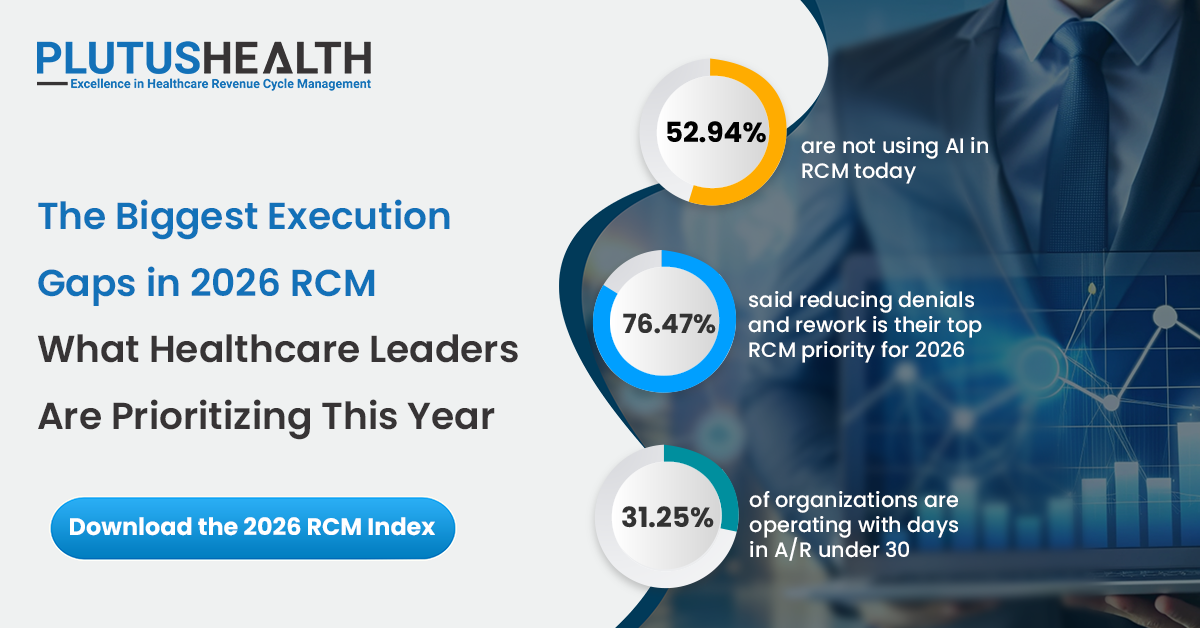Analytics in denial management: A data-driven approach to streamline RCM
Did you know that, on average, healthcare organizations experience a denial rate of 5-10% for claims submitted to insurance payers? Even though this number looks small, the loss to healthcare providers is huge, depending on the organization's size. By leveraging the potential of data-driven insights, healthcare providers can revolutionize their denial management processes, significantly reduce denials, and increase their revenue. In this blog, we will explore the transformative role of analytics in denial management. We will also learn what analytics offers healthcare organizations to achieve financial stability and optimize revenue cycles.
In this blog:
- What is denial management in RCM?
- Advantage of analytics in denial management
- Layers of denial analytics
- Implementation of analytics in denial management
What is denial management in RCM?
It is important to note that a significant portion of claim denials, up to 90%, are preventable with proper denial management. Claim denials can arise due to incomplete or inaccurate information, coding errors, documentation errors, eligibility issues, etc. Denials add administrative costs and workload for healthcare providers as they navigate the appeals process and resubmit claims. Healthcare providers must adopt proactive denial management practices to eliminate these financial challenges.
"The financial implications of unresolved denials are substantial. When claims are denied, healthcare organizations face delayed or lost revenue, impacting their ability to provide quality care and invest in critical resources."
- Kenneth Jeremiah, RCM expert at Plutus Health.
Types of claim denials
It is important to understand different types of denials before understanding the innovative ways and strategies to manage them. Understanding the types of denials help to plan your denial management strategies better.
Front-end denials (Addressing data and eligibility issues)
Front-end denials occur at the initial stage of the billing process. These denials often happen due to errors or omissions in patient information, eligibility, or registration. According to the Change Index report, front-end denials account for approximately 50% of all claim denials.
- 25% of front-end denials happen due to missing or invalid patient demographic information.
- 17% are due to inaccurate insurance verification.
These statistics highlight the importance of accurate data entry and thorough patient eligibility verification to reduce front-end denials.
Coding denials (Complexity of accurate medical coding)
Coding denials happen due to errors in the codes. modifiers, or complete the coding process. Accurate medical coding is crucial for clean claims submission and complete reimbursement.
Approximately 30% of total claim denials happen due to coding errors.
Inadequate documentation supporting the code used is a significant issue among coding denials. Approximately 18% of coding denials occur because of invalid claim data. It emphasizes the need for healthcare providers to ensure comprehensive documentation supporting services.
Medical necessity denials (Establishing the need for care)
Medical necessity denials occur when the services or procedures provided to patients are deemed not medically necessary by the insurance payer.
"Plutus Health found that medical necessity denials accounted for approximately 8% of all claim denials."
Medical necessity denials happen when healthcare providers fail to provide evidence to support the medical necessity of the services provided. Practices must focus on thorough and detailed documentation to overcome medical necessity denials.
Coverage denials (Meeting insurance policy criteria)
If the services or procedures provided to patients do not meet the criteria outlined in the insurance policy, the payers reject it under coverage denials. Each insurance plan's specific coverage limitations, exclusions, and restrictions influence these denials. Among coverage denials, the most common reasons include:
- Lack of pre-authorization (35%)
- Services not covered by the insurance policy (25%)
- Services exceeding allowed limits (15%)
Healthcare providers should ensure effective communication with payers, understand the coverage guidelines, and obtain necessary pre-authorization to minimize coverage denials.
Denial management is a critical process in healthcare revenue cycle management. It involves identifying, analyzing, and resolving claim denials from insurance payers.
Denial management ensures timely and accurate reimbursement for services rendered. It also helps healthcare providers maintain financial stability and optimize revenue cycles. Understanding the types and causes of claim denials, emphasizing their preventability, and recognizing the financial implications of unresolved denials are essential steps toward implementing proactive denial management strategies.
What is the role of analytics in denial management?
Analytics plays a significant role in denial management. Organizations that implemented predictive analytics for denial prevention experienced a 29% decrease in denial write-offs and a 19% improvement in clean claim rates.
“Healthcare providers that leverage the power of data to identify denials patterns and trends have claim denials <5%.”
By leveraging historical claims data, payers' guidelines, and industry benchmarks, analytics solutions can identify potential denial risks and highlight areas for improvement. These insights empower organizations to implement targeted strategies and help them prevent denials before they occur.
Plutus Health has seen that clients using analytics for denial management achieved a 42% reduction in denial write-offs and a 63% improvement in denial overturn rates. These statistics demonstrate the significant impact that analytics can have on denial prevention and recovery.
Advantage of analytics in denial management
Healthcare organizations are increasingly turning to analytics as a powerful tool to prevent and recover from claim denials. Analytics provide valuable insights into denial patterns, root causes, and proactive strategies for mitigation.
Improved accuracy
One of the primary benefits of employing analytics in denial management is improved accuracy in claims submission. Analytics aids healthcare providers in getting a comprehensive analysis of claims data. Reports generated by these analytics enable organizations to identify coding errors, documentation gaps, and other common causes of denials. By proactively identifying and addressing these issues, healthcare providers can ensure that claims are coded correctly and supported by the necessary documentation. It improves the accuracy of claims submission and increases the likelihood of reimbursement.
Analytics can also assist in identifying trends and patterns in denials associated with specific procedures, diagnoses, or payers. Organizations can make targeted improvements in coding practices, documentation requirements, and payer-specific guidelines by analyzing historical data and identifying recurring denial patterns. It helps to eliminate repetitive errors and ensures that claims are submitted accurately, reducing the chances of denials based on common coding or documentation issues.
Enhanced efficiency
Analytics streamlines denial management processes by automating data analysis and providing real-time insights into denial trends and patterns. Instead of manually reviewing each denial, analytics tools can quickly analyze large volumes of data, identify patterns, and highlight high-value denials that require immediate attention. Automation improves efficiency and allows healthcare providers to optimize staff workflow, which leads to improved productivity and faster resolution of denials.
Analytics can prioritize denials based on their likelihood of overturn and identify denials with a higher probability of successful appeals. It helps healthcare providers focus their efforts on denials with the greatest potential for recovery, reducing the time and resources spent on denials that may have a lower chance of overturn. By prioritizing denials effectively, organizations can expedite the appeals process and improve the overall efficiency of denial management.
Proactive denial prevention
Analytics plays a crucial role in proactive denial prevention by enabling organizations to identify denial risks and take preventive measures. By analyzing historical claims data, payers' guidelines, and industry benchmarks, analytics solutions can pinpoint potential denial patterns and root causes. This empowers organizations to implement targeted strategies such as staff education, process improvements, and documentation enhancements to prevent denials from occurring in the first place.
"Analytics can help identify coding patterns that have a higher likelihood of denials and enable organizations to provide targeted training to coding staff to address specific areas of concern."
Analytics can also identify common documentation gaps or information that needs to be included. By implementing proactive measures, such as improving documentation, healthcare providers can reduce the occurrence of denials related to documentation issues.
Continuous process improvement
Analytics plays a crucial role in driving continuous process improvement in denial management. Analytics enables organizations to make data-driven decisions regarding process enhancements, policy changes, and system optimizations.
Analytics helps to enhance communication with payers or implement technology solutions that reduce the risk of denials.
Improved provider-payer relationships
Analytics can also contribute to improved provider-payer relationships. Organizations can identify patterns and trends specific to different payers by analyzing denial data. This information can be used to engage in constructive conversations with payers, address systemic issues, and negotiate mutually beneficial contracts. Healthcare providers can have data-driven discussions with payers. By leveraging analytics, healthcare providers can collaborate with payers to optimize claim submission processes, reduce denials, and foster stronger partnerships.
Compliance and regulatory adherence
Healthcare providers can maintain compliance and adhere to regulatory requirements in denial management with analytics. Organizations can identify denials related to regulatory issues, such as billing and coding compliance, by analyzing data. Analytics tools can flag potential compliance risks, highlight areas of concern, and facilitate proactive measures to mitigate non-compliance. It helps organizations ensure that their denial management processes align with regulatory guidelines. Analytics also reduces the risk of penalties and financial losses associated with compliance violations.
Strategic planning and forecasting
Employing analytics in denial management enables organizations to engage in strategic planning and forecasting. Analytics can be used to develop proactive strategies, allocate resources, and set performance goals for denial management. Healthcare organizations can take a proactive approach to denial management by incorporating analytics into strategic planning, ensuring long-term financial stability and operational success.
What are the layers of denial analytics?
Denial management is a significant step in the healthcare RCM process. It aids healthcare providers in identifying the reasons for claim denials and effectively working on them. Denial analytics is a powerful tool that helps healthcare providers identify and prevent denials. There are three layers of denial analytics.
Descriptive analysis
The descriptive layer is the categorization and identification of denials. It helps to identify the prevalent denial patterns and the root cause of denials. Here the healthcare providers can understand the type of claims that get rejected most frequently and aid in creating strategies accordingly. Descriptive analysis helps to identify trends like diagnosis or specific procedures that lead to denials. The descriptive analysis also helps to find the specific payers that usually deny the claims. With this information, healthcare providers can understand the payer guidelines and can work on them precisely.
Diagnostic analysis
After descriptive analysis, diagnostic analysis is the second layer of denial analytics. In this layer, there is a deep dive into the root cause of denials. Diagnostic analysis helps healthcare providers know the exact cause of denials. It involves a comprehensive analysis of each claim individually to check for missing information and errors. All the data from (Electronic Health Records) EHRs is examined to find trends and patterns.
Predictive analysis
Predictive analysis is the most important layer of denial analytics. It helps healthcare providers to use data and predict the claims that might get rejected in the future. Knowing the claims with a high chance of denials help the staff to optimize their process and make the necessary changes to prevent them.
Predictive analysis analyzes past trends and patterns that have led to denials. It leverages artificial intelligence and machine learning to process huge chunks of data that can help to prevent denials.
Implementation of analytics in denial management
Implementing analytics in denial management is a strategic approach that healthcare organizations can adopt. Here is a step-by-step guide to help you implement analytics successfully in denial management.
Step 1: Define clear goals and objectives
Begin by defining your organization's goals and objectives for implementing analytics in denial management. It could include reducing denial rates, improving clean claim rates, enhancing revenue recovery, or streamlining workflow processes. Clear objectives will guide your analytics implementation strategy and ensure alignment with your overall revenue cycle management goals.
Step 2: Gather and centralize data
To implement analytics effectively, gathering and centralizing relevant data from various sources is crucial. The data can include claims, patient demographics, payer information, denial codes, and reimbursement data. Invest in a robust data management system that integrates data from different systems and ensures data accuracy & integrity.
Step 3: Identify key performance indicators (KPIs)
Determine the key performance indicators (KPIs) driving your denial management analytics. These KPIs may include denial rate, denial write-off value, denial reasons, payer-specific denial rates, clean claim rates, and revenue recovery rates. Establish benchmarks and targets for each KPI to measure your progress over time.
Step 4: Select an analytics solution
Evaluate and select an analytics solution that aligns with your organization's requirements and goals. Consider data visualization capabilities, predictive analytics functionalities, real-time reporting, and user-friendly interfaces. Collaborate with your IT department or engage with a trusted analytics vendor to implement the chosen solution effectively.
Step 5: Data cleansing and preparation
Before applying analytics algorithms, ensure that your data is clean and prepared for analysis. It involves identifying and resolving data quality issues, eliminating duplicates, and standardizing data formats. Clean, accurate, and well-prepared data is essential for obtaining reliable insights and accurate predictions.
Step 6: Perform analytics
Now that all the steps got completed, it is time to perform the most important step, analytics. You can use root cause analysis to understand the underlying reasons for denials. The predictive analysis identifies patterns, trends, and potential denial risks. Finally, a real-time analytics dashboard provides continuous monitoring of denial-related KPIs.
Step 7: Continuously evaluate and improve
Establish a feedback loop to evaluate and improve your denial management analytics implementation continuously. Regularly review your KPIs, compare performance against benchmarks, and identify areas of further optimization. Leverage analytics insights to refine your denial management strategies, adapt to evolving payer policies, and enhance revenue recovery.
How can Plutus Health help in denial analytics?
When providing exceptional RCM services to healthcare providers, Plutus Health has always benchmarked the KPI results. We leverage IPA (Intelligent Process Automation) to help you increase your accuracy and effectiveness. Our team has 15+ years of experience providing RCM services to healthcare providers in the US. We master denial management, and the average denial rate of the clients partnering with Plutus Health is <5%. Our analytics solution helps our denial management experts identify trends and patterns. We deeply study all the patterns to take preventive measures to minimize those denials. Click here to connect with our experts and learn more about our denial analytics solutions.



















































